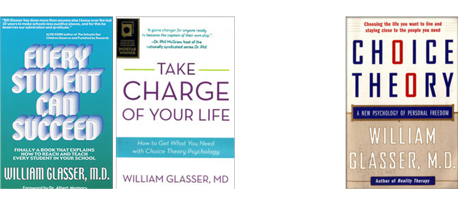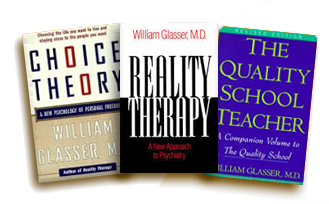-
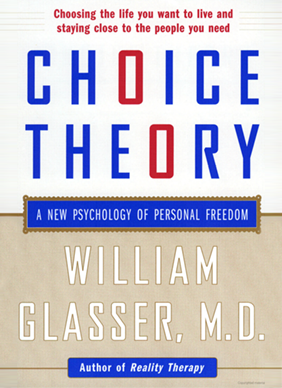
Choice Theory: A New Psychology of Personal Freedom
“Technology has progressed… because we are willing to or have embraced a new theory or a new way to use an old one.” “In almost all attempts to improve human progress, for example, to improve marriages, families, schools, or work, there has been no operational change in theory. External control is so firmly in the saddle that even when we make a little progress, we are blind to the fact that we have given up external control psychology and are starting to use what is, in essence, choice theory. What I am addressing is our need to become aware that there is another psychology.” — William Glasser, M.D.
-
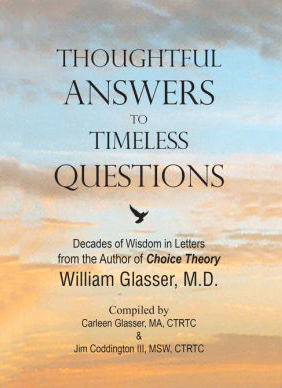
Thoughtful Answers to Timeless Questions
“If we continue to use the external control psychology which tears people apart and destroys relationships, we’ll make no progress in improving the way we get along with each other. That’s the main task of the world. It’s as important as the ozone layer and the greenhouse effect. What good would it be to have a healthy planet if we can’t get along together? To me, that’s the bottom line. I support all that everyone is doing in terms of environmental health, but the environment that exists between two people- the destructive environment of external control- should be replaced with the constructive, helpful, supportive environment of Choice Theory.”
-
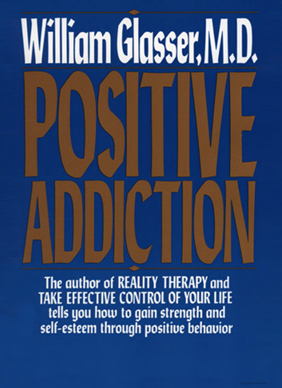
“The positive addict enjoys his addiction but it does not dominate his life. From it he gains mental strength which he uses to help himself accomplish whatever he tries to do more successfully. Unlike a negative addict, who is satisfied completely to live for his addiction, to the exclusion of everything else, a positive addict uses his extra strength to gain more love and more worth, more pleasure, more meaning, more zest from life in general. Positive addiction is especially valuable because it is a way in which anyone by himself can increase his strength. Every other way in which we gain strength depends on others, either for more love or more recognition, but no matter how lonely or how worthless you may be, if you can become positively addicted you can gain strength. You can then use this strength to gain more love and more worth.” – William Glasser, M.D.
-
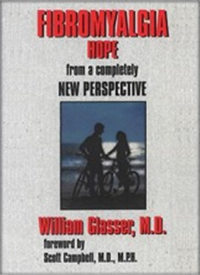
Fibromyalgia: Hope from a Completely New Perspective (SC)
“The use of these [psychotropic] drugs for fibromyalgia is no more supported by research than the use of antibiotics is supported for a viral infection. Psychotropic drugs are strong and change the physiology of the brain in many ways that are not yet understood and may add to the problem.” ” While you wait for an effective medical treatment that doesn’t take into account the relationship problems I have been explaining, I ask you to weigh the further possibility that the pain and disability you are experiencing may be caused by something few people- doctors and patients alike- ever consider. This element, creativity, is very much a part of every total behavior you choose. It can affect any or all of its components. Could it be that the more creative you are, the more you are susceptible to “diseases” such as fibromyalgia?”– William Glasser, M.D.
-
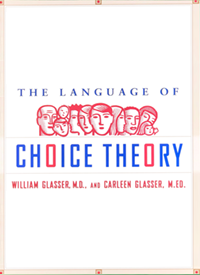
External Control “As soon as I come in the door, you start nagging. “Why weren’t you home earlier?” “The kids hardly see you.” “The toilet’s still running.” I tell you, I hate coming home anymore.” Choice Theory Alternative “I know you’re dissatisfied. I’m dissatisfied, too. You keep nagging, I keep withdrawing. Where are we going? Is this the marriage you want? Let’s get your mother to take care of the kids, so we can go away for a weekend and try to figure this thing out. I’ve given up caring who’s right and who’s wrong. I’d like some time to love you and to talk together. Anything would be better than this.”- William Glasser, M.D.
-
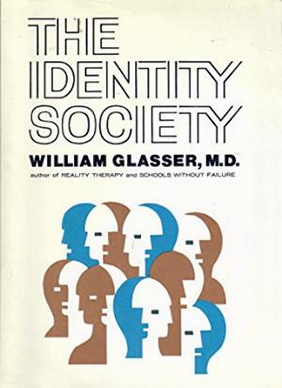
I am a doctor not because I can make money and find a very secure, prestigious place for myself high in the power structure but because I think I can practice medicine to become involved with my fellow man.
-
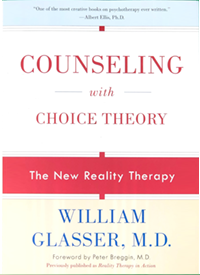
Counseling with Choice Theory: The New Reality Therapy
(This is the re-titled paperback edition of Reality Therapy in Action). “… it is what you choose to do in a relationship, not what others choose to do, that is the heart of reality therapy. In the movie As Good as it Gets, the lead character, Melvin Udall, portrayed by Jack Nicolson, is a textbook illustration of what is known as the mental illness obsessive-compulsive disorder, over which he has no control. But, following choice theory, I do not believe that Melvin is suffering from a mental illness or that he has no control over what he is doing. I believe he is choosing to obsess and compulse to deal with what is so obvious from the beginning of the film: He has no satisfying close relationships. To have any chance to lead a rewarding life, he, like all of us, needs at least one satisfying relationship. When we fail in the effort to connect with other people, as Melvin surely has, we suffer because the need to do so is as much built into our genes as the need to survive.” – William Glasser, M.D.
-
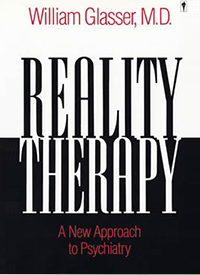
Reality Therapy: A New Approach to Psychiatry (1965)
“Do these widely different behaviors indicate different psychiatric problems requiring a variety of explanations, or are they manifestations of one underlying difficulty? We believe that, regardless of how he expresses his problem, everyone who needs psychiatric treatment suffers from one basic inadequacy: he is unable to fulfill his essential needs. The severity of the symptom reflects the degree to which the individual is unable to fulfill his needs. No one can explain exactly why one person expresses his problem with a stomach ulcer while another fears to enter an elevator; but whatever the symptom, it disappears when the person’s needs are successfully fulfilled.” — – William Glasser, M.D.
-
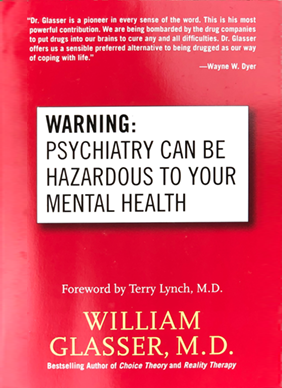
Warning: Psychiatry Can Be Hazardous To Your Mental Health
“But when you are unhappy and go to a psychiatrist who prescribes brain drugs, it is very easy to mistake the pleasure you may be getting from the drugs for happiness.” “… The drugs are prescribed with the idea that feeling better is all you need. But this isn’t all you need. It’s even worse than all you need, because you mistake the pleasure of the drug for happiness. You may feel better but you are just as lonely as you would be if you were in a bar drinking alone. That loneliness will soon overcome the pleasure the drug provides. There is no happiness drug, legal or illegal, that brings people closer together.” — William Glasser, M.D.”
-
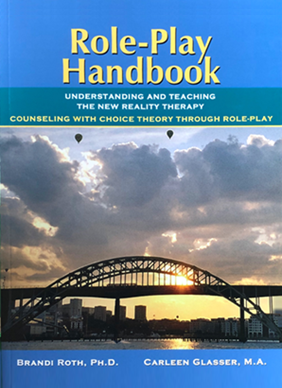
“Clients avoid difficult conversations. It is challenging to sort through thoughts about difficult topics, feelings, or actions. It is easier for the client to avoid them or to ignore them. Avoiding topics can lead to misunderstandings, unnecessary worries or behaviors that result in unhappy relationships. Role-play practice provides a safe vehicle to rehearse approaches to resolution and to practice facing dilemmas. Practicing thinking and feeling can lead clients toward an action plan.” – Brandi Roth, Ph.D. and Carleen Glasser, M.A.
-
Free Download
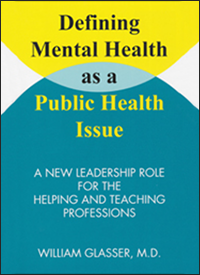
Defining Mental Health as a Public Health Issue- Booklet
“My recent effort, explained in this booklet, is to define the term mental health in a way completely different from the way it has been defined for over a hundred years. Psychiatrists, clinical psychologists, social workers and counselors call themselves mental health professionals but few of them can define, describe or explain what mental health or mental well-being actually is.“ “I and all the people who work with me through The William Glasser Institute start from the premise that mental health is an entity totally separate from mental illness. After you finish reading this booklet you will have a clear idea of why it is entitled, Defining Mental Health as a Public Health Issue, and how it can be used to help improve the quality of their lives.”– William Glasser, M.D.
-
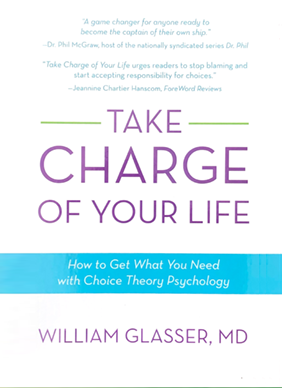
The following is an endorsement by Dr. Phil McGraw… “By showing the reader the liberation from external threats, the step to the freedom of internal liberation can be realized in stunningly simple ways. Of course, it takes courage and faith to change our thinking, but the understanding of “making sense out of non-sense” can be amazing, as I have seen these effects. This book will help each person become a more creative and gifted soul. Dr. Glasser has made a significant contribution to psychology, but also has made a tremendous gift for any reader.”
- Special Offer
- 10% Discount on orders of 20-49 books. 20% Discount on orders 50+ For details contact us at 310-313-5800
-
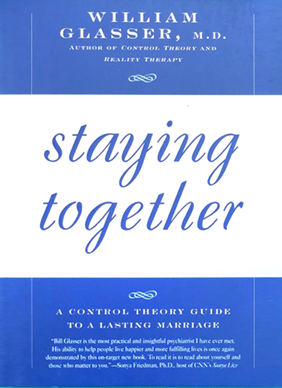
“We are involved with the wrong mate and he or she must change for us to be happy. But we remain the same, our mate doesn’t change, and our unhappiness continues. What we have to understand is that the only life we can control is our own and, in almost all instances, we can choose to change. “Depending on what changes we make in our lives, there is a strong possibility that our mate also may choose to change. And if he or she changes in the right direction, our marriages can become much better. Therefore, we can change only our own lives; we cannot change what others do. It is to this vital truth that this book is addressed.” – William Glasser, M.D.
-
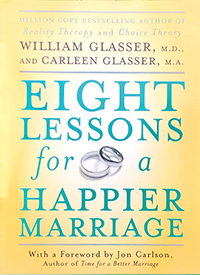
Eight Lessons for a Happier Marriage
“If you read each lesson together willingly, talk it over, and try to put the information in the lessons to work in your marriage, you should be able to enhance your marital happiness. The eight lessons become a marriage enrichment experience. As you go through the book, each of you will learn how to behave differently with each other than you are behaving now, and this way will be different from how almost all married couples have behaved with each other for thousands of years. From our experience, while the lessons will be new to you, they are neither difficult to understand nor complicated to put into practice.”— William Glasser, M.D. and Carleen Glasser, M.A.
-
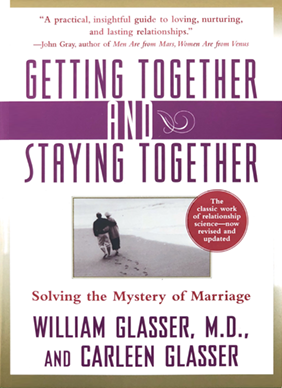
Getting Together and Staying Together
“The power of choice theory is that it helps us get along with other people, especially with the people close to us. In our experience, it is the only way to maintain a long-term, happy marriage. What we do when we practice choice theory when we have even an inkling of a problem is to think before we deal with each other. The first thing we think about is avoiding using the seven deadly habits, because they will separate us further and increase the problem. Next we make sure that we use one or more of the seven caring habits as we attempt to deal with our differences. As simple as it seems, it is almost impossible to do unless you recognize how much harm you are doing to you marriage with the deadly habits.”— William Glasser, M.D.
-

What is this Thing Called Love? The Essential Book for the Single Woman
“You either take the next step and fall in love with each other, or you fall out of love with love and it’s over. The whole fantasy of being in love with love needs another person for it to work, but it doesn’t have to be any particular person. I think you’re right. Mark’s not in love with you, he’s in love with love, and you’re the person who makes the fantasy work for him.” “Why do you call it a fantasy?” “It’s a fantasy because it isn’t real. Love is real; it takes two real people with real feelings for each other.” – William Glasser, M.D.”
-
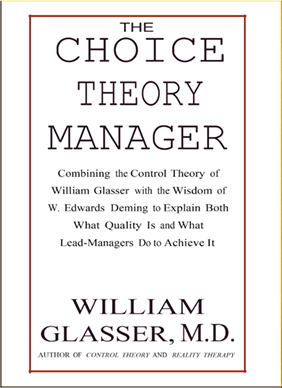
“No management tradition is more firmly fixed in the United States than that of the boss. Bosses are in charge of the workers; they tell them what, when, and how to do their job. They have the power to reward them for doing a good job and to punish them for not doing what they are told to do. If workers had no union or civil service protection, not only their economic future but their happiness is in the boss’s hands. Unfortunately, it is the unwise use of this power that effectively prevents us from achieving the quality work that is needed if we are to regain our competitive place in the market.” “Therefore, what mangers must do for quality is give up bossing or boss management and start leading or using lead management.”
-
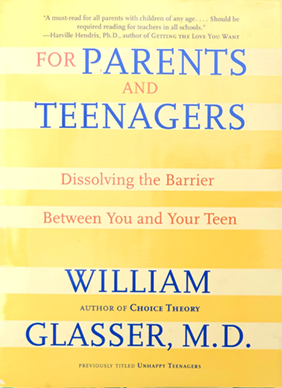
For Parents & Teenagers-Dissolving the Barrier…
“If you are having trouble with your teen, this is the result of a process that’s been occurring between you for a long time. To try to better describe this process, I typed the word disconnect into my computer’s thesaurus. What popped up were words I’m sure you recognize as you struggle to deal with your teenager; disengaged, separated, uncoupled, disassociated, and withdrawn. Hasn’t every confrontation and disagreement you’ve been having with your teenager accelerated this process? Is it unreasonable to ask yourself, wouldn’t it be better off to do whatever I can to reverse this process? Because, you know as well as I, unless you do something far different from what you’re doing now, this disconnection is going to get worse. In the next chapter, I’ll begin to show you some specific strategies for reconnecting with your teen. But first we need to understand how external control is driving both you and your teen’s behavior..— William Glasser.
-
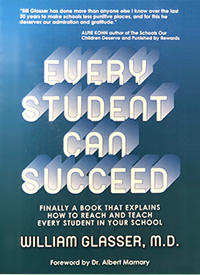
“In Chapter Ten of Choice Theory, I stressed the importance of redefining education. As long as we keep the present definition, education is acquiring knowledge- a definition obsolete since books became cheap and easily available- we will fail to improve school achievement. Using this definition, there has been no measurable improvement in the last fifty years no matter how we measure school success. We need to move to a new definition, education is using and improving knowledge that is congruent with recent findings on how the brain works and with the information age we have now entered.” — William Glasser, M.D.
-
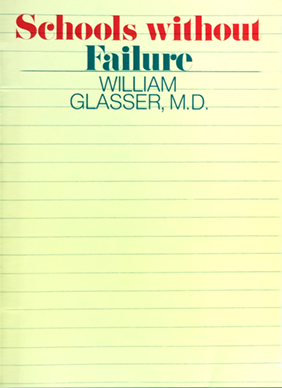
“Much has been written on the difficulties of improving education in the central city. From personal experience, I believe that most people who write about these schools have not raised the critical issue. They have been so obsessed with the social, environmental, and cultural factors affecting students that they have not looked deeply enough into the role of education itself has played in causing students to fail, not only in the central city but in all schools. It is the faults and shortcomings of the system itself that I wish to examine, and make suggestions to correct. — William Glasser, M.D.
-
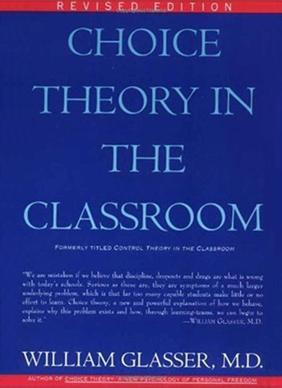
Choice Theory in the Classroom
“Once a teacher begins to consider abandoning the worker role altogether, she will want to learn what she can do as a manger which goes far beyond the traditional concept of direct, reward and punish. For example, unlike traditional managers, who spend little time worrying about whether the working conditions are satisfying, modern managers spend a lot of time structuring and restructuring the workplace to make it more satisfying because they believe that satisfied workers are much more productive.”— William Glasser, M.D.
-
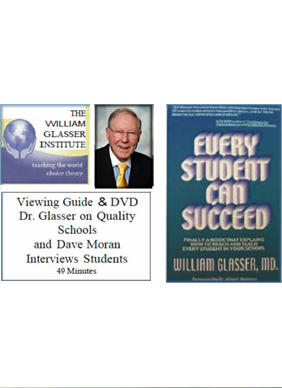
From the Viewing Guide for Dr. Glasser Quality Schools: “Whether you choose to view the DVD with a study group or on your own, it is a good idea to start by reflecting on your current understanding of Dr. Glasser’s teachings. Please consider what you know about: – Choice Theory including basic needs; – The Reality Therapy process to help change behaviors; – The criteria for becoming a Quality School; – The Deadly and Caring Habits; and, – His work on building relationships in classrooms and schools.” – Sue Tomaszewski
-
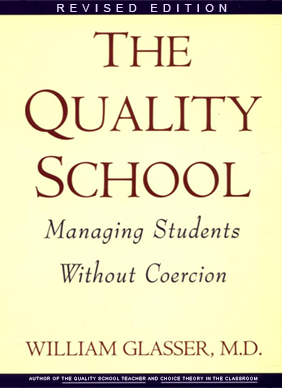
“Boss-teachers and administrators constantly lament that students are not motivated, but what they are actually saying is that they do not know how to persuade students to work. And as long as they continue to believe in coercion, they never will. When it comes to understanding motivation, boss-managers are looking for something that does not exist. But they keep looking because they, like almost everyone else, accept the external control theory. According to this theory, our behavior is almost always motivated by a stimulus that exists outside of ourselves.”— William Glasser, M.D.
-
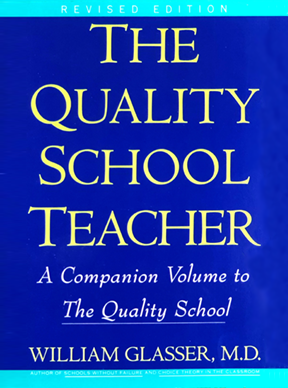
“He [Deming] stated, “A system of schools… should be a component in a system of education in which pupils from toddlers on up take joy in learning, free from the fear of grades and gold stars, and in which teachers take joy in their work, free from fear of ranking. It would be a system that recognizes differences between pupils and differences between teachers.” … A major flaw in our traditional educational system is that we consistently fail to “motivate” students to do useless work. Boss-managers can’t seem to learn that there is no way to motivate people to do what has no chance of satisfying their needs.” — William Glasser, M.D.
-
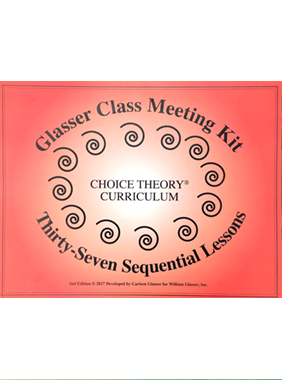
“Creating this kit for you to use to teach your students Choice Theory has been a labor of love for me. As a former teacher, I have such respect and admiration for the dedication I know you bring to your work with students. I have attempted to make this material easy for you to use and to provide a comprehensive learning experience for your students. In the class meetings you do with them, they can practice their speaking and listening skills and then use what they have learned to complete the assignments at the end of each meeting. These assignments continue the learning and in various ways supplement the academic standards in most lesson plans.”– (Introduction) – Carleen Glasser, M.A.”
-
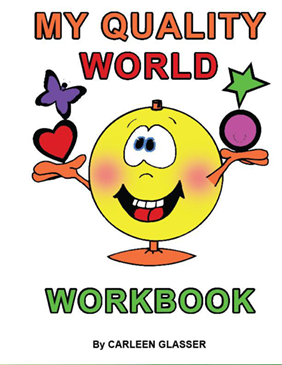
“Dear Boys and Girls, The ideas in this workbook are based on the work of Dr. William Glasser. Dr. Glasser is a very good man. He has helped people all over the world. His way of helping people is easy enough for children to learn. He teaches them how to take better control of their own lives by making choices that help them. In this workbook you will learn a special way t solve problems and get what you need. One idea for doing this came from the work of another nice man. His name is Dr. Robert Wubbolding. Let’s call him “Dr. Bob”. Dr. Bob writes books and teaches grown-ups how to use his formula. It is called “Radio Station WDEP.” You will use his idea in this book to solve your problems and to help you get what you need.” — Carleen Glasser, M.A.,
-
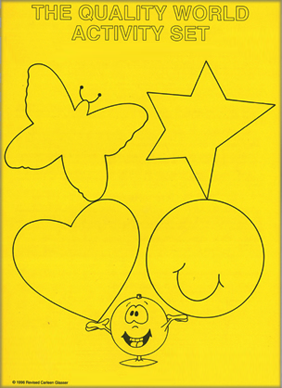
“Whenever things didn’t go your way, did you blame someone else? Did you say, “He made me do it!”? Did you ever hear anyone else say, “He made me mad, that’s why I hit him!” or “She started it by calling me a name! I had to call her one back!” These people are playing “The Blame Game.” They believe other people are responsible for what they choose to do or not to do. They are actually allowing their lives to be controlled by the behavior of others. DIRECTIONS: Have you ever played “The Blame Game”? In this space, write about something you did that you really thought was somebody or something else’s fault… Let your partner read what you wrote and you read what your partner wrote. Together, try to figure out who or what you each were allowing to control your situation.”– Carleen Glasser, M.A.
-
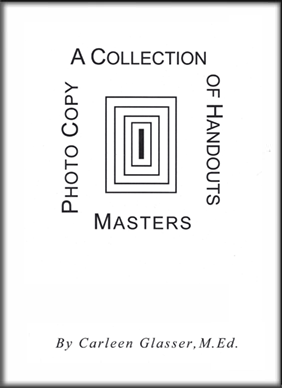
Carleen Glasser’s Collection of Handouts
“The best way to visualize total behavior is to think of all we do was if it were a car. To move, a car has to use all four of its wheels, and the back wheels always follow the front wheels. But the only wheels over which we have voluntary control are the front wheels, acting and thinking. We steer or control all of our behaviors by what we choose to do with the front wheels. We have no direct control over the back wheels. Therefore, we choose all our actions and our thoughts but we cannot choose our feelings and physiology; they follow our actions and our thoughts.”– Carleen Glasser, M.A.
-
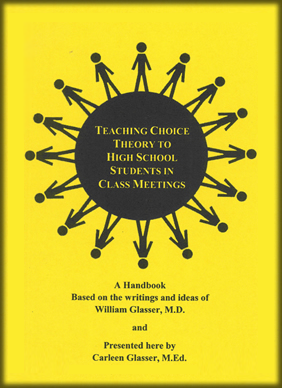
Teaching Choice Theory to High School Students
“One of the most valuable of human functions is our creativity. If students learn to recognize how they are creative, they may be able to find creative solutions to problems they face every day. In order to make creative choices, it is very important to self-evaluate to determine if our choices have a chance of working for us. It is a well-known fact that happy people take time to evaluate themselves; unhappy people waste a lot of time evaluating others.”– Carleen Glasser, M.A.
-
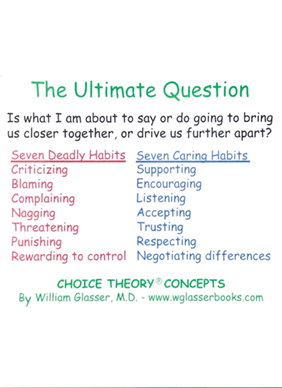
The Ultimate Question Kitchen Magnet-Key Relationship Habits of Choice Theory
-
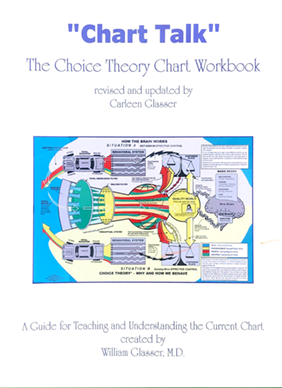
Chart Talk: The Choice Theory Chart Workbook or use dropdown for online version (PDF file)
This is a guide for teaching and understanding the brain as a control system as diagramed in the chart entitled, “How the Brain Works” which is included in the booklet. Information presented clearly details “why and how we behave“. Emphasis is placed on how Choice Theory is used to counsel and/or manage people. In order to show the difference between when we are Not Now in Effective Control and when we are Gaining More Effective Control, this section of the chart has been divided into two parts, Situation A at the top shown with the pink background) and Situation B at the bottom (shown with the yellow background). This is only done to show how exactly the same system works under two different conditions. Keep in mind that only one of these situations is happening at any given time. Although each of us is always attempting t move from Situation A to Situation B, it becomes the specific task of the counselor or coach to help people- be it friends, students, clients, or employees- make this move. —William Glasser, M.D.
-
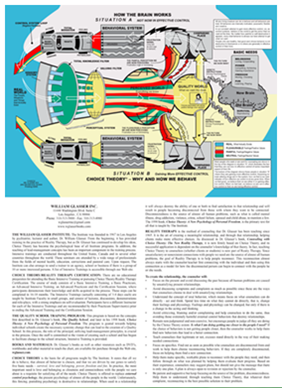
Choice Theory Basic Concepts Chart
A smaller version of “How the Brain Works”, this handy diagram includes brief descriptions of Choice Theory and Reality Therapy. 8 x 11.5 Full Color
-
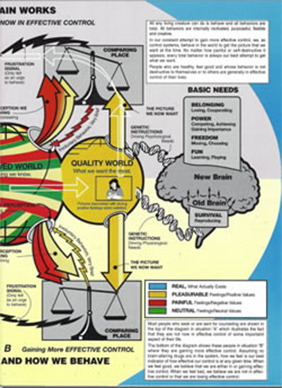
How the Brain Works – Large Poster
This provocative and innovative diagram of the brain as a control system clearly details “why and how we behave”. Dr. Glasser’s pre-medical training as an engineer is evident in this brilliant creation. 21-3/4″ x 34″ Full Color.

